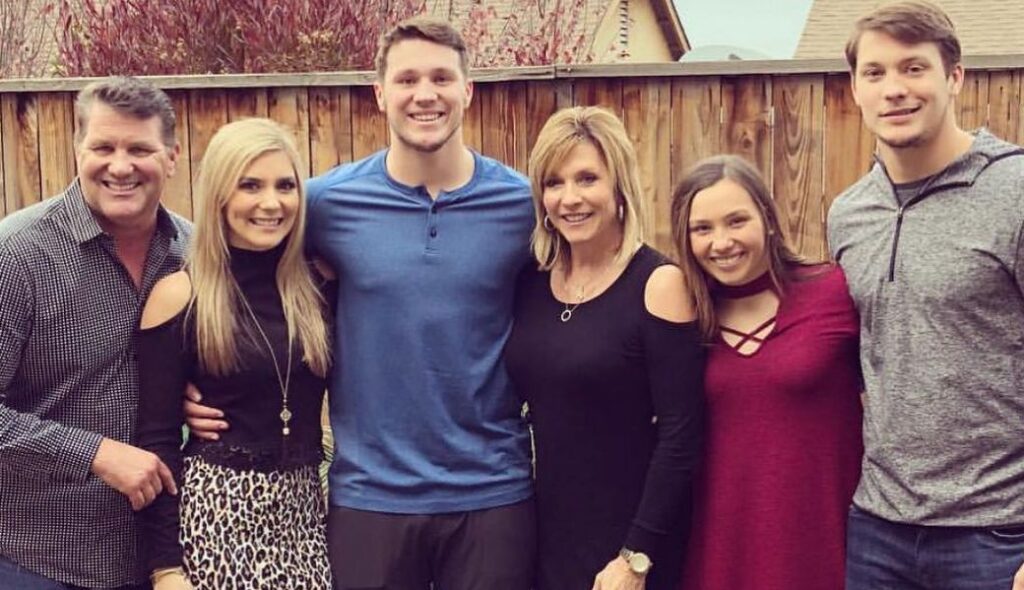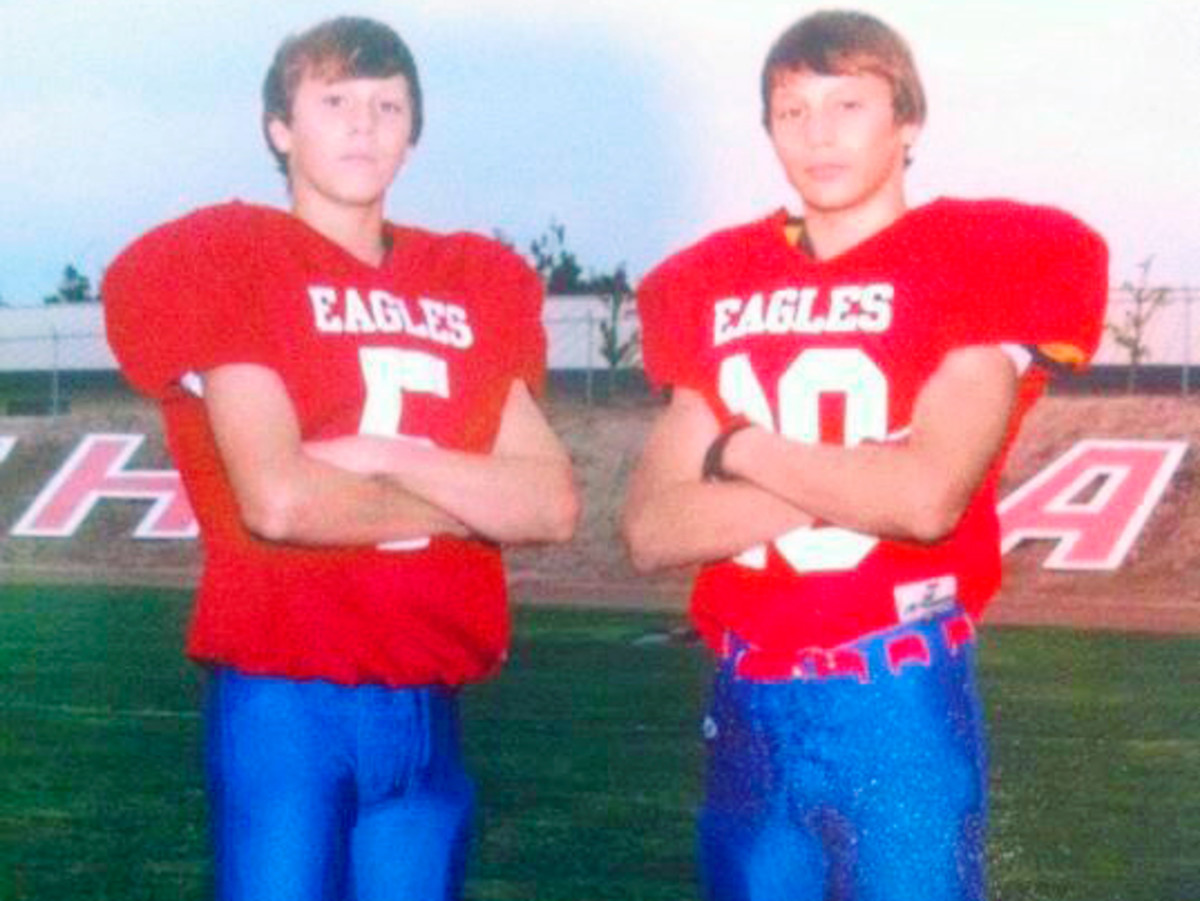When you hear the name Josh Allen, the first thing that comes to mind is likely the NFL star quarterback. But today, we're diving into a topic that hits closer to home—his brother’s battle with a rare disease. This isn’t just a story; it’s a call to action for awareness, support, and understanding. Let’s peel back the layers and explore what this journey means for families like the Allens and how it affects the broader community.
Now, you might be wondering, why does this matter? Well, diseases that affect loved ones, especially in high-profile families, can bring attention to conditions that often fly under the radar. Josh Allen’s brother’s condition has sparked conversations around rare diseases, and it’s time we listen up. This isn’t just about one family; it’s about the millions who face similar challenges daily.
Let’s get real here. Rare diseases often don’t get the attention they deserve, and that’s a problem. By shedding light on Josh Allen’s brother’s disease, we can spark change, promote research, and ensure that no family feels alone in their fight. So, buckle up, because we’re about to dive deep into this important topic.
Read also:Angela Unkrich Net Worth The Untold Story Of A Hollywood Mogul
Understanding Josh Allen's Brother's Disease
What Exactly Is It?
First things first, let’s break down what we’re talking about here. Josh Allen’s brother, Nick Allen, has a condition known as Duchenne Muscular Dystrophy (DMD). Yeah, that’s a mouthful, but it’s a big deal. DMD is a genetic disorder characterized by progressive muscle degeneration and weakness. It’s one of those diseases that doesn’t mess around, and it affects mostly boys.
Here’s the kicker: DMD is caused by a mutation in the gene responsible for producing dystrophin, a protein essential for maintaining muscle integrity. Without enough dystrophin, muscles break down faster than they can repair themselves. It’s like trying to build a house with crumbling bricks—it just doesn’t work.
Who Does It Affect?
Now, you might think, “Well, how common is this thing?” The truth is, DMD affects about 1 in every 3,500 to 5,000 male births globally. That might not sound like a lot, but for the families involved, it’s everything. And here’s the thing—it’s not just about the numbers. It’s about the impact on daily life, the emotional toll, and the constant fight for a better quality of life.
Imagine being a parent or sibling watching someone you love struggle with something so out of your control. It’s tough, and it’s why stories like Nick Allen’s are so important. They humanize the condition and remind us that behind every statistic is a person fighting, a family supporting, and a community that needs to step up.
The Journey of Nick Allen
Biography of Nick Allen
Let’s take a moment to get to know Nick Allen a little better. Born into a family of athletes, Nick’s life took a different path when he was diagnosed with DMD at a young age. Here’s a quick rundown:
| Name | Nick Allen |
|---|---|
| Born | March 15, 1992 |
| Diagnosis | Duchenne Muscular Dystrophy (DMD) |
| Residence | Louisville, Kentucky |
| Family | Brother: Josh Allen (NFL Quarterback) |
Nick’s story is one of resilience and determination. Despite the challenges posed by DMD, he’s remained a source of inspiration for his family and the wider community. His journey highlights the importance of support systems, both within families and in society as a whole.
Read also:How Old Is Shawty Bae The Rising Starrsquos Age Bio And Everything You Need To Know
Challenges Faced
Nick’s daily life involves navigating a world that isn’t always designed with accessibility in mind. From mobility issues to the need for constant medical care, the challenges are real. But here’s the thing—Nick doesn’t let them define him. Instead, he uses his experiences to advocate for greater awareness and support for those with DMD.
And let’s not forget the emotional side of things. Living with a chronic condition can be isolating, and that’s where family plays a crucial role. Josh Allen has been vocal about his brother’s strength and the lessons he’s learned from him. It’s a reminder that sometimes, the greatest athletes aren’t those on the field but those fighting battles off it.
Impact on Families and Communities
The Emotional Toll
When a family member is diagnosed with a rare disease, the ripple effect is significant. It’s not just about the person affected; it’s about everyone around them. The emotional toll can be overwhelming, but it’s also where the bonds of family and community shine the brightest.
Take the Allen family, for example. Josh Allen has spoken openly about how his brother’s condition has shaped his perspective on life. It’s a powerful reminder that challenges can bring people closer together. And that’s not just limited to immediate family—communities, too, have a role to play in offering support and understanding.
Financial Struggles
Let’s talk money, because let’s be real—medical expenses can add up fast. Families dealing with rare diseases often face financial burdens that can be crushing. From specialized treatments to adaptive equipment, the costs are steep, and insurance doesn’t always cover everything.
That’s where initiatives like fundraising campaigns and community support programs come into play. They help alleviate some of the financial stress and allow families to focus on what truly matters—caring for their loved ones. It’s a team effort, and every little bit helps.
Raising Awareness: The Importance of Education
Spreading the Word
Awareness is key when it comes to rare diseases. The more people know, the better equipped they are to offer support and advocate for change. That’s why stories like Nick Allen’s are so powerful—they put a face to the condition and make it relatable.
Here are a few ways you can help raise awareness:
- Share information on social media
- Attend or organize community events
- Support research initiatives
- Engage with advocacy groups
Every action, no matter how small, contributes to a larger movement for change. It’s about creating a world where no one feels forgotten or overlooked.
Current Research and Advances
What’s Being Done?
Science is making strides in the fight against DMD, and that’s good news. Researchers are exploring new treatments, therapies, and technologies aimed at improving the quality of life for those with the condition. Gene therapy, for example, holds promise as a potential game-changer in the treatment landscape.
But here’s the deal—research needs funding, and that’s where public support comes in. By donating to reputable organizations and participating in awareness campaigns, you’re directly contributing to the advancement of science and medicine.
Hope on the Horizon
While there’s still a long way to go, there’s reason to be hopeful. Advances in technology and medicine are paving the way for new possibilities. And with more people becoming aware of DMD, the momentum for change is growing stronger every day.
Stories like Nick Allen’s remind us that progress is possible, but it takes a collective effort. Every voice matters, and every action counts.
How You Can Help
Get Involved
Want to make a difference? There are plenty of ways to get involved:
- Volunteer with local organizations
- Participate in fundraising events
- Spread awareness through your networks
- Advocate for policy changes
It’s all about finding what works for you and committing to the cause. Whether you have five minutes or five hours, your contribution can make a difference.
Support Systems
One of the most impactful things you can do is offer support to families dealing with rare diseases. Sometimes, just being there and listening can mean the world. It’s about creating a community of empathy and understanding.
And let’s not forget the power of education. The more you know, the better equipped you are to help. So, take the time to learn about DMD and other rare diseases. Knowledge is power, and in this case, it’s also hope.
Conclusion: Taking Action
We’ve covered a lot of ground here, from understanding DMD to exploring the impact on families and communities. The story of Josh Allen’s brother, Nick, serves as a powerful reminder of the resilience and strength that can be found in the face of adversity.
But the journey doesn’t end here. It’s up to all of us to continue the fight, raise awareness, and support those affected by rare diseases. So, what will you do? Will you share this article? Attend an event? Make a donation? Every action counts, and together, we can create a world where no one feels alone in their fight.
Let’s keep the conversation going. Leave a comment, share your thoughts, and let’s work together to make a difference. Because at the end of the day, it’s not just about Josh Allen’s brother—it’s about every family, every community, and every individual touched by rare diseases. Let’s make their voices heard.
Table of Contents
- Understanding Josh Allen's Brother's Disease
- What Exactly Is It?
- Who Does It Affect?
- The Journey of Nick Allen
- Biography of Nick Allen
- Challenges Faced
- Impact on Families and Communities
- The Emotional Toll
- Financial Struggles
- Raising Awareness: The Importance of Education
- Spreading the Word
- Current Research and Advances
- What’s Being Done?
- Hope on the Horizon
- How You Can Help
- Get Involved
- Support Systems
- Conclusion: Taking Action


